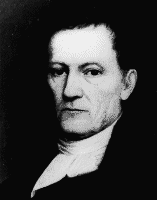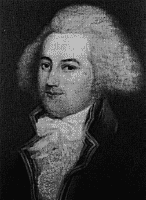 |
 |
 |
 |
 |
 |
 |
 |
![[image of flower]](../../ima/flowXS_02.gif)
![[image of flower]](../../ima/flowXS_02.gif)
Georgia DelegatesArchives n.p. |

Image: The National Portrait Gallery, Smithsonian Institution Baldwin was born at Guilford, CT, in 1754, the second son of a blacksmith who fathered 12 children by 2 wives. Besides Abraham, several of the family attained distinction. His sister Ruth married the poet and diplomat Joel Barlow, and his half-brother Henry attained the position of justice of the U.S. Supreme Court. Their ambitious father went heavily into debt to educate his children. After attending a local village school, Abraham matriculated at Yale, in nearby New Haven. He graduated in 1772. Three years later, he became a minister and tutor at the college. He held that position until 1779, when he served as a chaplain in the Continental Army. Two years later, he declined an offer from his alma mater of a professorship of divinity. Instead of resuming his ministerial or educational duties after the war, he turned to the study of law and in 1783 gained admittance to the bar at Fairfield, CT. Within a year, Baldwin moved to Georgia, won legislative approval to practice his profession, and obtained a grant of land in Wilkes County. In 1785, he sat in the assembly and the Confederation Congress. Two years later, his father died and Baldwin undertook to pay off his debts and educate, out of his own pocket, his half-brothers and half-sisters. That same year, Baldwin attended the Constitutional Convention, from which he was absent for a few weeks. Although usually inconspicuous, he sat on the Committee on Postponed Matters and helped resolve the large-small state representation crisis. At first, he favored representation in the Senate based upon property holdings, but possibly because of his close relationship with the Connecticut delegation, he later came to fear alienation of the small states and changed his mind to representation by state. After the convention, Baldwin returned to the Confederation Congress (1787-89). He was then elected to the U.S. Congress, where he served for 18 years (House of Representatives, 1789-99; Senate, 1799-1807). During these years, he became a bitter opponent of Hamiltonian policies and, unlike most other native New Englanders, an ally of Madison and Jefferson and the Democratic-Republicans. In the Senate, he presided for a while as president pro tem. By 1790, Baldwin had taken up residence in Augusta. Beginning in the preceding decade, he had begun efforts to advance the educational system in Georgia. Appointed with six others in 1784 to oversee the founding of a state college, he saw his dream come true in 1798 when Franklin College was founded. Modeled after Yale, it became the nucleus of the University of Georgia. Baldwin, who never married, died in 1807 at 53 after a short illness. Still serving in the Senate at the time, he was buried in Washington's Rock Creek Cemetery.

Georgia
Image: National Archives, Records of Exposition, Anniversary, and Memorial
Commissions Few was born in 1748. His father's family had emigrated from England to Pennsylvania in the 1680s, but the father had subsequently moved to Maryland, where he married and settled on a farm near Baltimore. William was born there. He encountered much hardship and received minimal schooling. When he was 10 years of age, his father, seeking better opportunity, moved his family to North Carolina. In 1771, Few, his father, and a brother associated themselves with the "Regulators," a group of frontiersmen who opposed the royal governor. As a result, the brother was hanged, the Few family farm was destroyed, and the father was forced to move once again, this time to Georgia. William remained behind, helping to settle his father's affairs, until 1776, when he joined his family near Wrightsboro, GA. About this time, he won admittance to the bar, based on earlier informal study, and set up practice in Augusta. When the War for Independence began, Few enthusiastically aligned himself with the Whig cause. Although largely self-educated, he soon proved his capacity for leadership and won a lieutenant-colonelcy in the dragoons. In addition, he entered politics. He was elected to the Georgia provincial congress of 1776, and during the war twice served in the assembly, in 1777 and 1779. During the same period, he also sat on the state executive council besides holding the positions of surveyor-general and Indian commissioner. He also served in the Congress (1780-88), during which time he was re-elected to the Georgia Assembly (1783). Four years later, Few was appointed as one of six state delegates to the Constitutional Convention, two of whom never attended and two others of whom did not stay for the duration. Few himself missed large segments of the proceedings, being absent during all of July and part of August because of congressional service, and never made a speech. Nonetheless, he contributed nationalist votes at critical times. Furthermore, as a delegate to the last sessions of the Confederation Congress, he helped steer the Constitution past its first obstacle, approval by Congress. He also attended the state ratifying convention. Few became one of his state's first U.S. senators (1789-93). When his term ended, he headed back home and served again in the assembly. In 1796, he received an appointment as a federal judge for the Georgia circuit. For reasons unknown, he resigned his judgeship in 1799 at the age of 52 and moved to New York City. Few's career continued to blossom. He served 4 years in the legislature (1802-5) and then as inspector of prisons (1802-10), alderman (1813-14), and U.S. commissioner of loans (1804). From 1804 to 1814, he held a directorship at the Manhattan Bank and later the presidency of City Bank. A devout Methodist, he also donated generously to philanthropic causes. When Few died in 1828 at the age of 80 in Fishkill-on-the-Hudson (present Beacon), he was survived by his wife (born Catherine Nicholson) and three daughters. Originally buried in the yard of the local Reformed Dutch Church, his body was later reinterred at St. Paul's Church, Augusta, GA.

Georgia Image: The Georgia Historical Society William Houstoun was the son of Sir Patrick Houstoun, a member of the council under the royal government of Georgia. He was born in 1755 in Savannah, GA. Houstoun received a liberal education, which included legal training at Inner Temple in London. The War for Independence cut short his training, and Houstoun returned home to Georgia. For many years members of Houstoun's family had been high officials in the colony. With the onset of war, many remained loyal to the crown, but William, a zealous advocate of colonists' rights, was among the first to counsel resistance to British aggression. Houstoun represented Georgia in the Conferation Congress from 1783 through 1786. He was chosen as one of Georgia's agents to settle a boundary dispute with South Carolina in 1785 and was one of the original trustees of the University of Georgia at Athens. When the Constitutional Convention convened in 1787, Houstoun presented his credentials as one of Georgia's delegates. He stayed for only a short time, from June 1 until about July 23, but he was present during the debate on the representation question. Houstoun split Georgia's vote on equal representation in the Senate, voting "nay" against Abraham Baldwin's "aye." Houstoun died in Savannah on March 17, 1813, and was interred in St. Paul's Chapel, New York City.
Georgia Very little is known about William Pierce's early life. He was probably born in Georgia in 1740, but he grew up in Virginia. During the Revolutionary War, Pierce acted as an aide-de-camp to Gen. Nathanael Greene and eventually attained the rank of brevet major. For his conduct at the battle of Eutaw Springs, Congress presented him with a ceremonial sword. The year Pierce left the army, 1783, he married Charlotte Fenwick of South Carolina. They had two sons, one of whom died as a child. Pierce made his home in Savannah, where he engaged in business. He first organized an import-export company, Pierce, White, and Call, in 1783, but it dissolved less than a year later. He made a new start with his wife's dowry and formed William Pierce & Company. In 1786, he was a member of the Georgia House of Representatives and was also elected to the Confederation Congress. At the Constitutional Convention Pierce did not play a large role, but he exerted some influence and participated in three debates. He argued for the election of one house of the federal legislature by the people and one house by the states; he favored a 3-year term instead of a 7-year term in the second house. Because he agreed that the Articles had been insufficient, he recommended strengthening the federal government at the expense of state privileges as long as state distinctions were not altogether destroyed. Pierce approved of the resulting Constitution, but he found it necessary to leave in the middle of the proceedings. A decline in the European rice market adversely affected his business. Soon after he returned to Savannah he went bankrupt, having "neither the skill of an experienced merchant, nor any reserve capital." Only 2 years later, on December 10, 1789, Pierce died in Savannah at age 49 leaving tremendous debts. Pierce's notes on the proceedings of the convention were published in the Savannah Georgian in 1828. In them, he wrote incisive character sketches that are especially valuable for the information they provide about the lesser-known delegates. Archives n.p. |
 |
 |
 |
 |